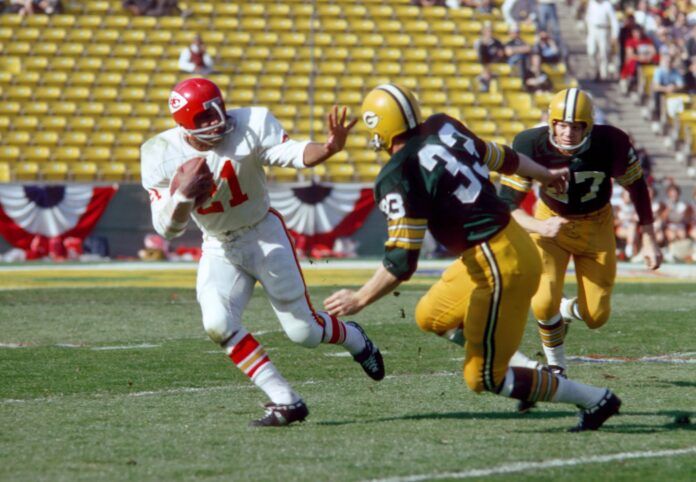Nearly all of this week’s attention has been focused on Super Bowl 57, but how did the NFL get to this point? Let’s turn back the clocks to Jan. 15, 1967, the date of Super Bowl 1. Who won the first Super Bowl, and what led to the NFL-AFL merger?
Who Won the First Super Bowl?
The first Super Bowl featured the National Football League champion Green Bay Packers against the American Football League champion Kansas City Chiefs.
The Packers comfortably won the game, 35-10. Green Bay secured the first-ever Super Bowl trophy, which was later named after their legendary head coach, Vince Lombardi.
History of Super Bowl 1
Although we now refer to the 1967 Packers-Chiefs game as Super Bowl 1, it was then known as the AFL-NFL World Championship Game. The term “Super Bowl” wasn’t used until two years later.
The NFL had existed for more than 40 years by the time the AFL started in 1960. After some initial problems between the leagues, the NFL and AFL agreed to a merger in June 1966. The two organizations decided to merge into a single league beginning with the 1970 season.
MORE: Ranking Every Super Bowl of All-Time From Worst to First
Before that official merger, the NFL and AFL opted to play a championship game. Pre-game planning wasn’t nearly as robust as it is today, as the location of contests (Los Angeles) wasn’t set until Dec. 1, while the date of the game (Jan. 15) wasn’t formalized until Dec. 13.
The Chiefs had finished the regular season with an 11-2-1 record and had blown out the Buffalo Bills in the AFC Championship Game. The Packers, who had won the NFL Championship in three of the prior five campaigns, went 12-2 in the regular season before defeating the Dallas Cowboys in the NFL title game.
The Green Bay Packers Dominated Super Bowl 1
Although the Chiefs came into Super Bowl 1 with an outstanding offense led by quarterback Len Dawson, nearly everyone believed the Packers — featuring their own future Hall of Fame QB in Bart Starr — were the better team.
Green Bay started the scoring when Starr found Max McGee for a 37-yard touchdown in the first quarter. The Chiefs missed a field goal on their ensuing drive, but a Curtis McClinton TD reception tied the game at seven in the second quarter.
The Packers regained the lead when fullback Jim Taylor scored on a 14-year sweep. Chiefs kicker Mike Mercer hit a 31-yard field goal just before halftime to make the score 14-10, and Kansas City had hope.
However, the Chiefs would not score for the remainder of the game. Green Bay safety Willie Wood intercepted Dawson early in the third quarter and set up the Packers at KC’s 5-yard line. Elijah Pitts ran the ball in for a score on the very next play.
The Chiefs only crossed midfield once more for the duration of the contest. Meanwhile, Green Bay scored two more touchdowns — a 13-yard reception by McGee and a 1-yard rush by Pitts — and walked away with a 35-10 victory in Super Bowl 1.
Super Bowl 1 Marked the Start of the NFL-AFL Merger
The Packers won Super Bowl 1 and Super Bowl 2, but the AFL soon got its revenge in Super Bowl 3. New York Jets quarterback Joe Namath guaranteed a victory over the Baltimore Colts and ultimately delivered with a 16-7 win, giving the AFL its first Super Bowl win.
The Chiefs, losers of Super Bowl 1, won their first Super Bowl trophy in Super Bowl 4. That was the final Super Bowl played with the NFL and AFL as separate leagues.
The NFL-AFL merger took effect with the 1970 season. The two leagues officially joined forces and realigned to create the American Football Conference (AFC) and National Football Conference (NFC), with three divisions — East, Central, and West — in each conference.

